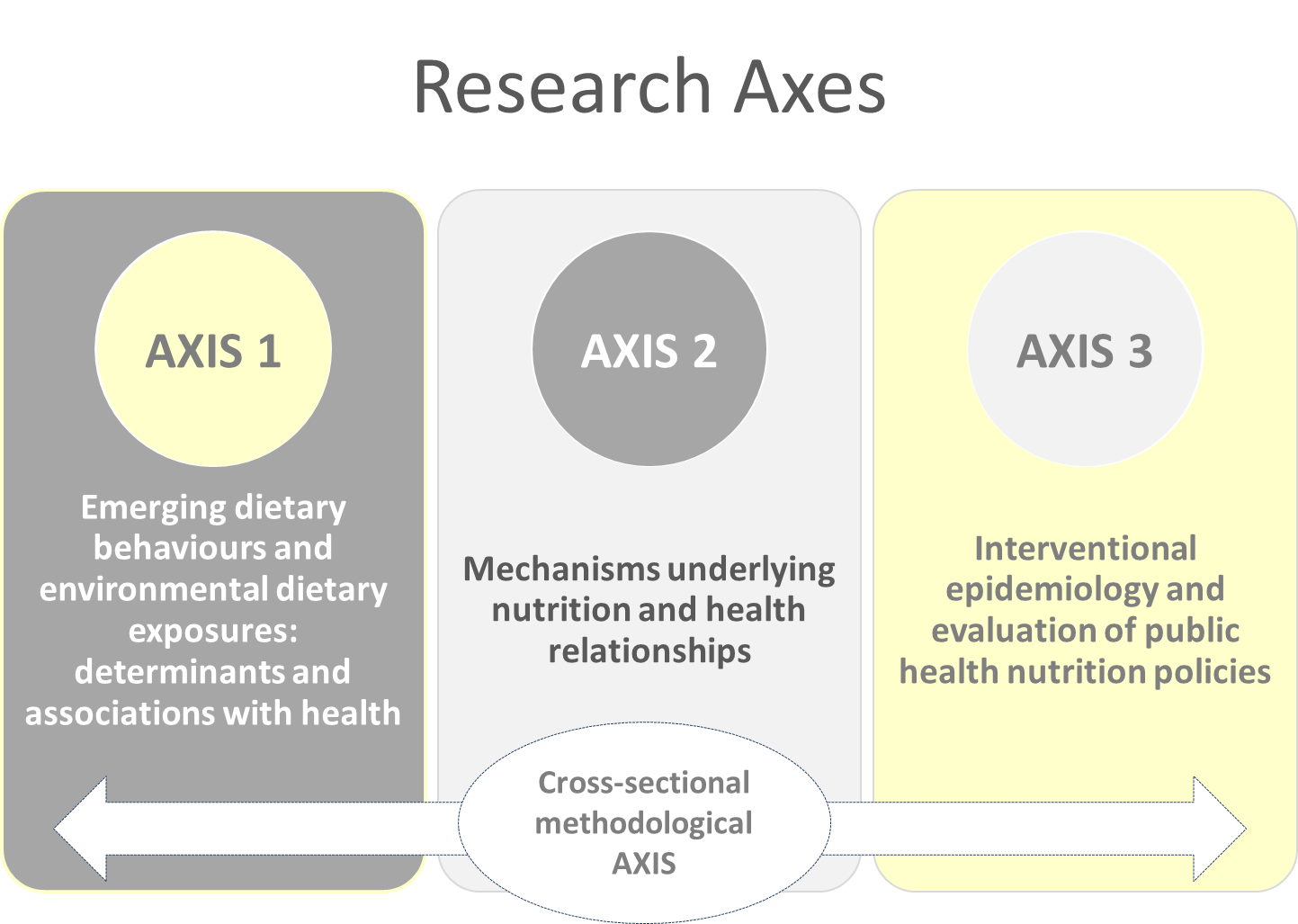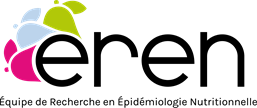Our overarching goals are to elucidate the complex relationships between nutrition and health, to understand the mechanisms underlying these relationships, and to carefully investigate the full spectrum of determinants of dietary behaviors. We strive to provide evidence-based knowledge for the elaboration and refinement of public health policies with the aim of improving primary and tertiary prevention of chronic diseases through healthy and sustainable nutrition.
We continually develop innovative epidemiological research programs in collaboration with academic partners from diverse disciplines (experimental and clinical research, sociology, psychology, social marketing, economy and agriculture). Our ambition is to be able to integrate emerging knowledge at multiple levels, from omics and other biomarkers to holistic macro-level risk factors. This will allow us to better grasp the complex roles of nutritional and other causes of chronic disease, beyond the traditional “risk factor – pathology” approach.
Our research reflects the main priorities of Inserm as outlined in its Strategic Plan 2015-2020. Notably, Priority # 1 pertains to integrated and multidisciplinary research, adapted to the needs and expectations of society and of public health policies (objective 5 of research plan in public health). Our research work is also fully in line with the 2016 Inra AlimH Department Strategic Scheme (CT1-4).
Our research work can be grouped into 3 thematic research axes and 1 cross-sectional methodological axis:

AXIS 1: Emerging dietary behaviors and environmental dietary exposures: determinants and associations with health
Some of our main research work is focused on emerging and little known nutritional exposures and behaviors. In fact, the existing prospective cohorts worldwide often have access to somewhat limited nutritional data (e.g. few dietary recalls or records, semi-quantitative FFQs), with no possibility of taking into account emerging exposures and nutrition-related behaviors. In contrast, the NutriNet-Santé e-cohort represents a great opportunity to explore such new areas, using detailed, up-to-date dietary data collected through repeated 24h dietary records (3 every 6 months); these records are in turn crossed with a food composition database containing >3,300 items, each decline in several dozens of commercial brands, with a supplementary FFQ, and with a substantial number of specific questionnaires on dietary practices and exposures that continually enrich our databases. Our research focuses on:
• Emerging dietary exposures
• Novel determinants of dietary practices: e.g. psychological, geographical, intuitive eating, sources of food supply, complex multi-determinant models
• Nutrition and dietary practices of specific subgroups
AXIS 2: Mechanisms underlying the nutrition and health relationships
Mechanisms underlying nutrition-health associations remain largely unexplored. Their clarification is key to 1) better understand disease etiology, 2) increase the weight of evidence of the established relationships, and 3) gather knowledge about the bioactive nutritional compounds involved in order to refine prevention strategies. Our well-phenotyped cohorts coupled with the associated large biobanks (containing samples of blood, urine, DNA, NutriNet-Santé n=19 600; SU.VI.MAX n=13 017) allow us to develop innovative research projects with a focus on:
- The interplay between epidemiology and experimental research: Mutlidisciplinary projects are being set up in which the work derived from diverse expertise domains is mutually enriching.
- Omics: Discovery of new biomarkers of disease risk and exploration of the food metabolome, linked with our very detailed dietary data in order to uncover novel biomarkers of usual nutritional exposure.
- Gut microbiota (role of nutrition, microbiota of specific populations, associations with health outcomes): EREN coordinates the CRESS Microbiota working group and participated in the FP7 UE Metacardis program. In 2017, we began work on a new research program on nutrition, metabolomics, microbiota and immunity within the framework of the LabEx “Milieu Interieur” Consortium to which EREN belongs (n=1000 healthy blood and stool donors, of whom 500 have provided two samples one month apart, and 150 of whom also participate in the NutriNet-Santé cohort). We have started stool collection for subsamples of the NutriNet-Santé cohort and plan to extend the collect to a broader range of participants in a near future. We are also planning case-cohort studies to investigate blood biomarkers of microbiota activity associated with health outcomes.
AXIS 3: Interventional epidemiology and evaluation of public health nutrition policies
Our investigation of the impact of various public health nutrition policies is strengthened by knowledge about the determinants of social inequalities regarding nutrition and health and knowledge about the differential impact of such policies across social strata. We are involved in the “Precision Public Health” innovative framework which brings together expertise from epidemiology (EREN), economy (INRA ALISS/GAEL), sociology (LEPS Paris 13 University) and marketing (RITM Paris South University and INSEEC). We continually develop observational, interventional and simulation studies for the study of the efficacy of front-of-pack nutrition labels, food taxation, and for the reduction of social inequalities regarding nutrition in disadvantaged subgroups. For these projects we rely on data from the NutriNet-Santé cohort, and also envision the set-up of ad hoc intervention studies (for example: students from Nice and Paris 13 Universities, cancer patients from the Seintinelles program, etc.). Overall, research in Axis 3 has 3 main priorities:
• Develop theoretical frameworks for evaluation of the impact of public health nutrition strategies and policies
• Develop experimental and epidemiological research on public health nutrition interventions
• Model the potential impact of public health nutrition interventions
CROSS-SECTIONAL METHODOLOGICAL AXIS
Our team is well positioned at the national and international level regarding methodological expertise in nutritional epidemiology. Specifically, our work focuses on:
• E-epidemiology: We continue to pursue our methodological research in this area. Notably, the potential of connected devices as sources of epidemiological data is explored through observational and interventional studies aiming at improving exposure assessment (e.g. bracelet-derived data on physical activity, geolocation) or for testing the effect of an intervention (e.g. scanning of bar codes to determine the “Nutriscore” of different foods).
• Medico-administrative databases: EREN was the first research team in France to obtain authorization by the State Council (in 2012) to link data from our cohorts with data from the national health insurance system (which includes detailed information on prescription medication use, sick leaves, etc). In addition to augmenting our databases, such access allows us to set up specific programs focused on long-term drug use in interaction with nutrition.
• Innovative statistical methods and big data: The complexity and size of epidemiological data are increasing exponentially. Innovative approaches (mediation analyses, complex nutritional/toxicological exposure profiles, models of diet optimization, data mining approaches) are being tested to answer new and complex questions raised by nutrition and health research.
• Advanced dietary exposure assessment: Given our detailed assessment of nutritional exposures coupled with the clinico-biological data stored within our large biobanks, our cohorts are particularly suitable for methodological research in dietary exposure assessment. Our aims are 1) to uncover novel biomarkers of nutritional exposure (e.g. by untargeted MS metabolomics exploring the food metabolome), and 2) to assess inter- and intra-individual variability and stability of nutritional biomarkers, metabolomic signatures and microbiota composition.






